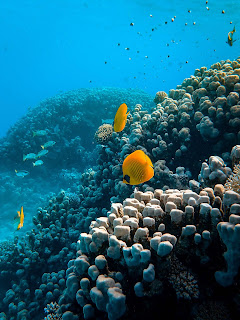Dynamite vs Cyanide Fishing: What's the Difference?
"A society is defined not only by what it creates, but by what it refuses to destroy." - John Sawhill
It is everyone's responsibility to protect and help take care of our oceans and the marine life it holds. Learn more about Dynamite and Cyanide fishing - its difference and major effect to the marine environment.
Dynamite and Cyanide fishing are both methods of collecting live fish and is an illegal activity that mankind is doing on our seas to just easily catch fish.
The once beautiful marine environment under the sea was ruined by man's greed and laziness.
Instead of using the typical conventional hooks and nets, they used bombs and cyanide poisons to kill fishes.
Unfortunately, the coral reefs and other sea creatures which are not their purpose to capture are also involved on this destructing activity.
Let us take a closer look on what is dynamite and cyanide fishing is all about and its effect to marine environment:
Dynamite Fishing or Blast Fishing

Dynamite fishing uses bombs to set under water to kill school of fish and for their easy collection. A typical home-made bomb would include ammonium nitrate; substance normally used as fertilizer.
The dead fishes floating on the water will then be scooped out, and the marine environment underneath was totally destroyed leaving it dead and devoid of life.
The fishes are killed by shock waves caused by the blast; the corals were also damaged and broken into pieces.
The blasted areas caused by explosives are very slow to recover especially the formation of corals because of difficulty establishing on loose substrate.

Cyanide fishing, on the other hand, uses sodium cyanide mixture to stun the fish; they spray this poison on the individual layers of the coral reefs.
The caught fishes are mainly used for the supply of the growing market for aquarium fishes.
How does cyanide poison affects marine population?
The cyanide concentration really slows photosynthesis in zooxanthellae, the unicellular algae resides on corals, sea anemones, sponges, mollusks and jellyfishes which translocate the products of photosynthesis to the host.
So when this happens, the coral reefs lose their colour and may eliminate their major food source.
Another thing, the sodium cyanide, when broken down into sodium and cyanide ions, can block the oxygen-transporting hemoglobin on fish thus oxygen is prevented from reaching the cells.
Some small fishes that can’t take a high dosage of this poison dies in the process. So imagine how many species living on a particular population of underwater environment.
These two illegal practices are the major threats in the marine population and coral reef ecosystems.
It will highly contribute to the decline in marine species and the very slow recovery of coral reefs.
The blown up coral reefs will again take years to form; making the area damaged and lifeless.
We know that the government banned these practices in order to save and protect our marine environment. But people are just too selfish and lazy to do their share in reducing the planet's major issues on marine environment.
They only want to take and take what's the underwater world has to offer and not thinking of caring it for future use again.
What is important to them is today, that they can make more money and sell a heavy catch.
So what about tomorrow?
If you think that a small area wouldn’t harm the world, think again. If more and more people will think that way, summed it up and you will get a whole ratio. Even small things can contribute to a big change.
So when these things happen, there will be death all over the place...
thus making it hard to imagine that the once beautiful underwater nature...
not all too long ago, used to be like this:

There is enough in this world for man's needs, but it can never satisfy man's greed. Let us all be aware of the consequences of own actions. We know what is the right thing to do.
I am spreading this word for the sake of your and my future generations. We owe this world to them.
Let us protect and help save marine environment.
This content reflects the personal opinions of the author. It is accurate and true to the best of the author’s knowledge and should not be substituted for impartial fact or advice in legal, political, or personal matters.






Comments
Post a Comment